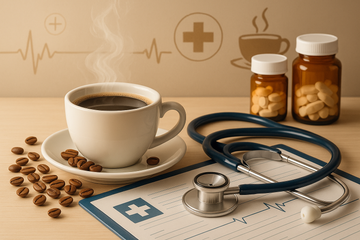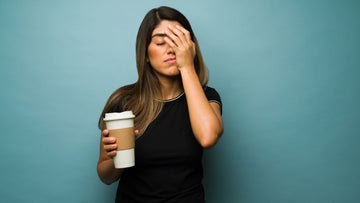
For many of us, coffee is a non-negotiable ritual. But if you take prescription meds or supplements, that daily brew can do more than perk you up—it can change how your body absorbs, processes, or responds to what you’re taking. The result? Weaker treatment effects, stronger side effects, or unpredictable symptom control. This guide breaks down the most common medicine–coffee interactions, what to do about them, and how a truly caffeine-free swap lets you keep the ritual without the risks.
First things first: caffeine ≠ coffee (and decaf still has caffeine)
Most “coffee interactions” are really caffeine interactions. Caffeine is an active stimulant with real pharmacology—affecting the nervous system, heart rate, blood pressure, and drug-metabolizing enzymes. The FDA’s general guidance is to cap daily caffeine at ~400 mg for most healthy adults (roughly 2–3 large cups), but many people need far less—especially if they’re on certain meds or are sensitive to caffeine. U.S. Food and Drug Administration
A quick misconception: decaf isn’t caffeine-free. Depending on the brand and brew, a cup of decaf can still contain several milligrams of caffeine—enough to matter for highly sensitive folks or for specific drug interactions. Mayo Clinic
Four common places coffee trips up your meds
1) Thyroid hormone (levothyroxine)
Coffee can significantly reduce levothyroxine absorption if it’s taken with or soon after your pill, lowering the hormone that actually reaches your bloodstream. In clinical studies, drinking espresso with levothyroxine cut absorption and delayed peaks, which can destabilize thyroid levels and symptoms. The typical advice: take levothyroxine on an empty stomach with water and wait ~60 minutes before coffee. Notably, a liquid levothyroxine formulation appears less affected by coffee, but always follow your prescriber’s instructions. American Thyroid AssociationEndocrine Society
What to do: Swallow levothyroxine with water first thing in the morning; set a timer before brewing. If mornings are tough, ask your clinician whether a bedtime dose (well separated from food/supplements) or a liquid formulation is appropriate.
2) Bone health meds (bisphosphonates like alendronate)
These medicines are notoriously fussy about absorption. The rule is strict: take with plain water only, stay upright, and avoid coffee, tea, milk, juice, or even mineral water around dosing, or the drug may not be absorbed well enough to protect your bones. nhs.ukdoclibrary-rcht.cornwall.nhs.uk
What to do: If you’re on a weekly or monthly bisphosphonate, schedule it on a morning when you can wait the recommended time (usually 30–60 minutes) before any food or beverages other than water.
3) Certain antibiotics—especially ciprofloxacin
Ciprofloxacin (and some other quinolones) slows the breakdown of caffeine by inhibiting the CYP1A2 enzyme. That means the same cup of coffee can feel like two: more jitters, palpitations, anxiety, and insomnia—plus a longer “buzz” than you bargained for. FDA labeling and MedlinePlus both warn that ciprofloxacin can increase caffeine’s effects. FDA Access DataMedlinePlusDrugs.com
What to do: While you’re on ciprofloxacin (and for a day or so after), avoid or minimize caffeine from coffee, tea, energy drinks, colas, and even chocolate. If you do have caffeine, keep it small and earlier in the day.
4) Iron supplements (and low iron concerns)
Polyphenols and other compounds in coffee and tea reduce iron absorption. If you’re treating iron deficiency—or just on a prenatal with iron—drinking coffee too close to your dose can blunt the benefit. Patient guidance typically suggests avoiding tea and coffee for about an hour before and after taking iron, and pairing iron with vitamin C-rich foods to boost uptake. UHSRoyal National Orthopaedic Hospital
What to do: Take iron with water and vitamin C (e.g., orange or kiwi) and put your coffee at least an hour away on either side.
“But my blood pressure is fine…” (until it isn’t)
Caffeine can cause short-term rises in blood pressure, particularly in people who aren’t daily users or who are sensitive. If you’re on anti-hypertensives, that temporary bump can work against your meds during the window after you drink. The American Heart Association notes caffeine’s stimulant effects and recommends moderation tailored to your personal risk profile. www.heart.org
What to do: If you have high blood pressure, track your numbers with and without caffeine. Discuss a trial of lower-caffeine or caffeine-free routines with your clinician if readings are inconsistent.
What about antidepressants and mental health meds?
Two key issues pop up:
-
PK interactions (enzyme level): Some antidepressants (notably fluvoxamine) and other psych meds interact with caffeine metabolism. Fluvoxamine can dramatically slow caffeine clearance, extending its half-life six-fold in research—so a normal coffee can feel like an all-nighter. Lippincott Journals
-
PD effects (how it makes you feel): Independent of enzyme interactions, caffeine can worsen anxiety and insomnia, which may undermine treatment goals for anxiety or depression. If you’re struggling with jitteriness or sleep while on psych meds, your caffeine intake is worth a closer look. Cambridge University Press & Assessment
What to do: If you’re on fluvoxamine (or notice caffeine makes anxiety or sleep worse on any antidepressant), consider switching to a non-caffeinated routine or discuss a tailored plan with your prescriber. Drugs.com
Hormones & caffeine: a quick note on birth control
Oral contraceptives can prolong caffeine’s half-life, meaning caffeine hangs around longer and may feel stronger than expected. Modern reviews and meta-analyses have confirmed slower caffeine clearance in oral contraceptive users. While this doesn’t reduce contraceptive efficacy, it can magnify typical caffeine side effects like insomnia or jitters in some people. FrontiersJAMA Network
What to do: If evenings are restless or you feel “too wired,” move any caffeine earlier—or trial a caffeine-free swap.
Timing tips that actually work
-
Separate smartly.
-
Levothyroxine → take with water, wait ~60 minutes before coffee. American Thyroid Association
-
Iron → avoid coffee/tea for ~1 hour before and after your dose; add vitamin C to help. UHS
-
Bisphosphonates → plain water only, and wait the label-specified time before any food or drink. nhs.uk
-
-
Know your “interaction window.”
On meds like ciprofloxacin or fluvoxamine, even small amounts of caffeine can hit harder. Consider going fully caffeine-free during therapy (and for a short tail after) to avoid amplified side effects. FDA Access DataMedlinePlus -
Don’t rely on decaf if you must be caffeine-free.
Decaf still contains a little caffeine—fine for many people, but not if you’re highly sensitive or on meds where any caffeine matters. Mayo Clinic
When to be extra cautious
-
You’re on meds with narrow therapeutic windows (e.g., thyroid replacement). American Thyroid Association
-
You’re taking drugs that change caffeine metabolism (e.g., ciprofloxacin, fluvoxamine). FDA Access DataLippincott Journals
-
You have hypertension, anxiety, sleep problems, or palpitations that worsen with caffeine. www.heart.org
-
You’re correcting iron deficiency or low ferritin. UHS
Always confirm the specifics with your pharmacist or prescriber—they’ll tailor advice to your exact medication list and health history.
Keeping the ritual—safely
If you’ve been told to avoid caffeine—or you’ve discovered it clashes with your meds—your choices are usually (a) give up the ritual, or (b) gamble with timing. There’s a third option: swap to a caffeine-free, stimulant-free cup that still feels like coffee.
Not Coffee was created for exactly this scenario. It’s brewed from roasted chicory and organic carob (and, in our ground version, roasted chickpea)—no caffeine, no stimulants—so you can keep the warmth, the aroma, and the moment without the pharmacologic wildcards. It comes in instant (works like instant coffee) and ground (works in espresso machines, stovetops, and plungers), so your routine stays your routine—just calmer and more compatible with your care plan.
If your doctor has advised you to eliminate caffeine—or you’ve noticed your meds work better without it—this swap can simplify life: no timers, no guesswork, no surprise side effects.
Bottom line
Coffee can be part of a healthy life for many people, but when you’re taking certain medications or supplements, caffeine can change the rules—reducing drug absorption (levothyroxine, bisphosphonates), amplifying stimulant side effects (ciprofloxacin, some antidepressants), or interfering with nutrient repletion (iron). The safest strategy is smart separation (timing) or, when needed, a true caffeine-free alternative that preserves your ritual without the risks. American Thyroid Associationnhs.ukFDA Access DataMedlinePlusUHS
Sources & further reading
-
American Thyroid Association: Coffee interferes with levothyroxine absorption. American Thyroid Association
-
Endocrine Society: Liquid levothyroxine less affected by coffee (emerging evidence). Endocrine Society
-
NHS: How and when to take alendronic acid; avoid coffee/tea/milk. nhs.uk
-
Royal Cornwall Hospitals Trust: Alendronic acid patient guidance; water only. doclibrary-rcht.cornwall.nhs.uk
-
FDA & MedlinePlus: Ciprofloxacin increases effects of caffeine; caution advised. FDA Access DataMedlinePlus
-
Mayo Clinic: Caffeine content in common beverages (including decaf). Mayo Clinic
-
American Heart Association: Caffeine’s cardiovascular effects and moderation advice. www.heart.org
-
NHS/University Hospital Southampton: Iron supplement instructions—separate from tea/coffee. UHSRoyal National Orthopaedic Hospital
-
Frontiers in Pharmacology (systematic analysis): Oral contraceptives prolong caffeine half-life. Frontiers





